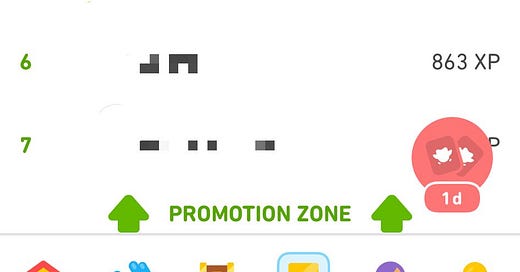Note 75: Re-learning how to learn
Learning is hard, average matters—and something about pineapples
Learning is hard.
Last year, I learned how to ride. This year, I’m learning how to swim. And last week I played badminton for the first time. And all I can tell you is, I don’t know how kids do it. Because that’s how it’s felt every time: like being a child again, except while looking like an adult, which feels like the worst of both worlds. It’s especially more tricky because each of those things is about learning to move differently: on a bicycle, in water, on a court. (Who asked me, right?)
And as if that’s not enough, I’m also learning Spanish, which is basically learning how to talk all over again. I’ll be exploring this more in a future essay, but for now, I’ll just say I have a new and deeper appreciation for why people struggle to learn as they get older.
Learning in Spanish is aprender, by the way, which makes me think of “apprehend”, which in turn is a great word for what happens in learning: you grasp something new.
An average essay
This week I wrote about being average, and why that’s not the bad thing we tend to frame it as. I had a couple responses to the effect of, “I agree with the general idea, but the word ‘average’ just feels wrong to me.” One friend even suggested “normal” instead, saying ”average” connoted “not up to par”. But as I pointed out, that was precisely the point I was getting at. Average only feels below par when we’ve assumed “par” is the top. Consider, for instance, that a synonym for “below par” is “below average”—and yet, we somehow see “up to par” as being above average?
Here’s how it began:
It’s funny, isn’t it, how average is somehow a bad word?
You wouldn’t consider it a compliment if someone called a project you worked on or a meal you made average. You certainly wouldn’t take it very kindly to have our work called average, or our lives, and God help you if you dared to say that to a parent about their kids. Why be average when you can be special, right?
But, as Dash says to his mum in The Incredibles, if everyone is special, then no one is.
Read the whole thing here:
More is better—or is it?
I read a great essay this week by journalise and sci-fi author Cory Doctorow. He was writing about Mastodon, the new network people are moving to from Twitter (I’m on there myself, by the way), but it really was a reflection on human nature. He argues that we tend to organise in small groups, but smaller groups are harder to control or make money from. And so those who desire power are always motivated to coalesce us into larger groups. As he puts it, “Happy people, the kind who eat sandwiches together, are boring. They don’t buy much.”
Then he goes on to talk about how the story of the Tower of Babel is for him a lesson in the importance of decentralisation.
"Every five or six minutes, someone in the social sciences publishes a PDF with a title like “Humans 95 Percent Happier in Small Towns, Waving at Neighbors and Eating Sandwiches.” When we gather in groups of more than, say, eight, it’s a disaster. Yet there is something fundamental in our nature that desperately wants to get everyone together in one big room, to “solve it.” Our smarter, richer betters (in Babel times, the king’s name was Nimrod) often preach the idea of a town square, a marketplace of ideas, a centralized hub of discourse and entertainment—and we listen. But when I go back and read Genesis, I hear God saying: “My children, I designed your brains to scale to 150 stable relationships. Anything beyond that is overclocking. You should all try Mastodon.”
— Cory Doctorow, God Did the World a Favor by Destroying Twitter
I think his read of the story rather over-emphasises the decentralisation aspect, but I found it interesting all the same, and there’s something there I want to write about, at least in part as a response to him. (To his credit, Doctorow himself admits he might be misreading it, as he’s an atheist himself.) I do agree, though, that organising in large numbers tends to prove a recipe for human trouble, and there’s something to the idea that we thrive in smaller numbers.
Maybe more isn’t always better.
Funny pineapple
I’ll leave you with the absolute funniest video I’ve seen in ages. Every so often you run into something that’s just too good to not share, and I found this genius. From the music, to the writing, to the sheer humour of it all.
Enjoy.
If you enjoyed reading this, consider giving this Note a like—and go on and share with any friends you think would enjoy Notes on Being Human!






Learning is always tasking and takes commitment, but when placed on full/ immense concentration it turns out as if you were born with what you’ve learnt.
This is an awesome encourager for growing minds!!!👍
Learning is certainly not easy, especially at a certain age with certain things. I too learned to cycle and swim last year and it gave me a new appreciation for my kids 😂. I kept asking them, “how do you do it?”.
However, when you learn to do that thing that seem so alien, you build up confidence. And the sigh of aha.....incredible!